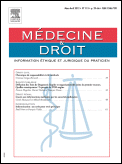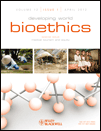
BIOETHICS
Scope & Guideline
Championing Innovative Research in Bioethics for a Better Tomorrow.
Introduction
Aims and Scopes
- Ethical Implications of Emerging Technologies:
The journal consistently focuses on the ethical challenges posed by advancements in medical technologies, including artificial intelligence, machine learning, and genomic editing. It emphasizes the need for ethical frameworks that can adapt to rapid technological changes. - Social Justice and Equity in Healthcare:
There is a strong emphasis on addressing issues of equity, inclusion, and social justice within the healthcare system. The journal publishes work that critiques systemic racism and advocates for marginalized communities in healthcare decision-making. - Patient Autonomy and Informed Consent:
The journal explores the complexities of patient autonomy, informed consent, and the ethical considerations surrounding these concepts, particularly in vulnerable populations and sensitive medical contexts. - Interdisciplinary Approaches to Bioethics:
The journal promotes interdisciplinary dialogue, bringing together insights from philosophy, law, public health, and social sciences to enrich discussions on bioethical issues. - Global Health Ethics:
It addresses bioethical considerations in global health contexts, including how cultural, social, and economic factors influence health equity and ethical practices. - Moral Distress and Ethical Consultation:
The journal highlights the phenomenon of moral distress among healthcare professionals and the role of ethics consultations in navigating complex ethical dilemmas.
Trending and Emerging
- Racial Justice and Health Equity:
There is a significant increase in publications addressing racial justice within healthcare, emphasizing the need for an anti-racist approach and the dismantling of systemic barriers. - AI and Machine Learning Ethics:
The ethical implications of artificial intelligence and machine learning in healthcare are becoming a central theme, with discussions focused on accountability, transparency, and the impact on patient care. - Environmental Justice in Bioethics:
Emerging discussions on environmental justice highlight the intersections between health, climate change, and bioethical considerations, reflecting a growing awareness of global health disparities. - Community Engagement in Research:
There is an increased emphasis on community engagement and participatory research approaches, recognizing the importance of including diverse voices in bioethical discussions and decision-making. - Digital Health Ethics:
The rise of digital health technologies has led to a burgeoning interest in the ethical implications of data privacy, consent, and the use of digital tools in patient care. - Global Health Disparities:
Emerging themes focus on global health disparities, particularly in the context of pandemics and public health emergencies, emphasizing the need for ethical frameworks that address inequities on a global scale.
Declining or Waning
- Traditional Ethical Frameworks:
There is a noticeable decline in the publication of papers strictly adhering to traditional ethical frameworks, such as principlism, as newer, more context-sensitive approaches gain traction. - Purely Theoretical Discussions:
The focus on purely theoretical bioethical discussions has diminished in favor of more practical, applied research that addresses real-world implications and case studies. - Universalist Approaches to Ethics:
There seems to be a waning interest in universalist ethical principles that do not account for contextual variability, as more nuanced and culturally sensitive approaches are preferred. - Individual-Centric Ethics:
The journal appears to be moving away from strictly individual-centric ethical considerations towards more collective and community-oriented frameworks that address systemic issues. - Traditional Medical Ethics:
The focus on conventional medical ethics, particularly in isolation from broader socio-political contexts, seems to be diminishing in favor of discussions that integrate social justice and public health perspectives.
Similar Journals

Asian Bioethics Review
Advancing Critical Conversations in BioethicsAsian Bioethics Review, published by SPRINGER, is a premier journal indexed with ISSN 1793-8759 and E-ISSN 1793-9453, dedicated to advancing discourse in the interdisciplinary field of bioethics across Asia and beyond. Established in 2015, this esteemed publication has rapidly gained recognition, achieving a Q1 ranking in Philosophy and Q2 in key categories such as Health Policy and Issues, Ethics and Legal Aspects in 2023. With its robust Scopus rankings highlighting its significance across diverse domains—including a remarkable 98th percentile ranking in Philosophy—the journal serves as a vital platform for researchers, ethicists, and policymakers to explore pressing ethical issues and contribute to policy development in health and social sciences. Although not open access, the journal ensures a wide reach through institutional subscriptions, making it an essential resource for students and professionals committed to ethical practices in healthcare. Set in the dynamic backdrop of Singapore, "Asian Bioethics Review" continues to shape the conversation around bioethical practices in the Asian context and globally.

Medecine & Droit
Exploring the Intersection of Health and JusticeMedecine & Droit, an esteemed journal published by ELSEVIER MASSON, CORP OFF, serves as a vital resource for the intersection of law and medicine. Since its inception in 1995, this journal has facilitated scholarly discourse by publishing innovative research, case studies, and reviews that explore the complexities of legal frameworks impacting medical practice and public health. Although currently classified in the fourth quartile within both the Law and Medicine (miscellaneous) categories for 2023, its contributions are important for legal professionals and healthcare providers seeking to navigate the evolving landscape of medical laws. With an ISSN of 1246-7391 and E-ISSN 1873-6475, it provides essential insights and stimulates interdisciplinary collaboration within academia. Authors and researchers are encouraged to contribute and engage with critical topics shaping the future of medicine and law through this essential publication.

JOURNAL OF MEDICAL ETHICS
Fostering Integrity in Medical Practice and PolicyJOURNAL OF MEDICAL ETHICS, published by the esteemed BMJ PUBLISHING GROUP, is a leading journal that has been pivotal in advancing the discourse on ethical issues in healthcare since its inception in 1975. This UK-based journal, with an ISSN of 0306-6800 and an E-ISSN of 1473-4257, is well-regarded for its high-quality, peer-reviewed articles that delve into the complex moral dimensions surrounding medical practices, health policies, and social sciences. With a commendable impact, JOURNAL OF MEDICAL ETHICS has achieved Q1 quartile rankings across multiple categories, including Arts and Humanities and Health Policy in 2023, reflecting its significant influence and relevance in the field—ranked #23 of 552 in Arts and Humanities (Miscellaneous) with a 95th percentile, and #26 in Health Policy with a 91st percentile. Researchers, professionals, and students alike can benefit from the journal's commitment to fostering a deeper understanding of ethical considerations vital to the medical community, although it currently does not offer open access options. The journal's comprehensive examination of issues, ethics, and legal aspects continues to make it an essential resource for those dedicated to shaping the ethical landscape of healthcare.

Journal of Ethics
Pioneering Research in Ethical PracticesJournal of Ethics is a premier academic journal devoted to the exploration and analysis of ethical theories and practices within various disciplines. Published by SPRINGER in the Netherlands, this prestigious journal has established itself within the field of Philosophy, boasting a commendable Q1 classification in the 2023 category quartiles. With an impressive Scopus rank of 145 out of 806 in the Arts and Humanities sector, it occupies the 82nd percentile, indicating its significant impact and reach. The journal aims to provide a platform for rigorous discussion and research that addresses contemporary ethical issues, making it an essential resource for researchers, professionals, and students alike. Although not an Open Access journal, it offers various access options to ensure that critical insights and scholarly contributions are disseminated widely.

THEORETICAL MEDICINE AND BIOETHICS
Illuminating the Intersection of Ethics and Medical Innovation.THEORETICAL MEDICINE AND BIOETHICS, published by SPRINGER, is an esteemed journal dedicated to exploring the complex intersections of medicine, ethics, and law. With its ISSN 1386-7415 and E-ISSN 1573-1200, this journal serves as a vital platform for scholars, practitioners, and students interested in the ethical implications of medical practices and innovations. Although it currently holds a Q4 impact factor in the categories of Issues, Ethics and Legal Aspects and Medicine (Miscellaneous) as of 2023, its relevance is amplified by its commitment to fostering critical discourse in a rapidly evolving field. The journal features a diverse range of articles that address profound ethical dilemmas in healthcare, making it a significant resource for contemporary research from 1997 to the present. As an open-access journal, it ensures that cutting-edge knowledge is readily available, inviting contributions that challenge conventional thought and advance the field of bioethics.

Acta Bioethica
Fostering Global Conversations on Bioethical ChallengesActa Bioethica is a pivotal open access journal published by the Universidad de Chile's Centro Interdisciplinario de Estudios Bioética, dedicated to the multidisciplinary exploration of bioethical issues in health policy and social sciences. Since its inception in 2000, the journal has fostered dialogue among researchers, professionals, and students, addressing the complexities of ethical practices in diverse health contexts. With an impressive commitment to accessibility, Acta Bioethica has become a vital resource for those engaged in understanding the ethics of healthcare in Latin America and beyond. Although currently ranked in the lower quartiles of Scopus in both health policy and social sciences, the journal is steadily gaining recognition for its unique contributions to bioethics. The journal accepts contributions in both English and Spanish, ensuring a wider reach and impact in the academic community. Located in Santiago, Chile, and active from 2007 to 2024, Acta Bioethica continues to be an essential platform for advancing research and discussions in the ever-evolving field of bioethics.

PERSPECTIVES IN BIOLOGY AND MEDICINE
Bridging Disciplines, Shaping FuturesPERSPECTIVES IN BIOLOGY AND MEDICINE, published by the esteemed Johns Hopkins University Press, has been a cornerstone of interdisciplinary dialogue since its inception in 1957. With a rich history spanning over six decades, this journal delves into the multifaceted interactions between biology and medicine, offering insights that are vital for health policy, ethics, and the philosophy of science. Recognized for its impact, it holds a Q2 ranking in the History and Philosophy of Science category and Q3 rankings in several other relevant fields as of 2023. While not an open-access publication, it provides critical analyses and discussions that are indispensable for researchers, professionals, and students alike. With its committed editorial team, PERSPECTIVES IN BIOLOGY AND MEDICINE continues to foster scholarly engagement and is poised to shape the future discourse in the biosciences.

Developing World Bioethics
Advancing ethical discourse in global healthcare.Developing World Bioethics, published by WILEY, is an esteemed journal dedicated to the exploration and advancement of ethical issues in health and healthcare within developing countries. Since its inception in 2001, this journal has become a critical platform for disseminating scholarly research and discourse that address complex bioethical challenges in varied socio-economic contexts. With an impressive Q2 ranking in multiple categories, including Health Policy and Issues, Ethics and Legal Aspects, it stands out as a vital resource among its peers, boasting significant Scopus rankings that highlight its influence and contribution to the fields of health and social sciences. The journal is committed to fostering interdisciplinary dialogue and insight, making it an invaluable asset for researchers, professionals, and students keen on bioethics and health policy. While the journal operates on a subscription basis, it provides broad access to its diverse range of articles, ensuring that cutting-edge bioethical perspectives are available to stakeholders worldwide, with a focus on innovative solutions and best practices in healthcare systems globally.

South African Journal of Bioethics and Law
Empowering research that shapes health policy and practice.South African Journal of Bioethics and Law, published by HEALTH & MEDICAL PUBLISHING GROUP, stands as a vital academic platform for discussions at the intersection of bioethics and legal studies. With an ISSN of 1999-7639, this journal has embraced an Open Access model since 2008, ensuring global accessibility for researchers, practitioners, and students alike. Based in South Africa, the journal operates from PRIVATE BAG X1, PINELANDS, CAPE TOWN 7430, and features diverse articles that span a multitude of pertinent topics across health professions, law, and public health. It proudly holds a Q3 ranking in Health Professions and Law sectors, affirming its status within the scholarly community. Notably, for the year 2023, it has achieved impressive placements in Scopus ranks, reinforcing its commitment to disseminating high-quality research and fostering dialogues that influence policy and practice in these critical domains. Researchers exploring the intricate ethical and legal dimensions of healthcare will find this journal an indispensable resource.

HASTINGS CENTER REPORT
Pioneering discussions on health ethics and philosophy.The HASTINGS CENTER REPORT, published by WILEY, is a leading journal in the fields of bioethics, health policy, and the philosophical underpinnings of healthcare. Established in 1971, this influential publication provides a critical platform for the discussion of ethical issues in health, medicine, and biotechnology, highlighting the intersection between ethical theory and practical health challenges. The journal achieves remarkable academic stature, achieving Q1 rankings in both Issues, Ethics and Legal Aspects and Philosophy, alongside Q2 standings in Health Policy and Health (social science) categories, reflecting its broad interdisciplinary impact. With its wide readership and rigorous peer-review process, the HASTINGS CENTER REPORT serves as an essential resource for researchers, practitioners, and students dedicated to advancing ethical perspectives in health-related discourse. While the journal operates under traditional access options, its contributions resonate deeply within the academic community, fostering informed dialogue on pressing ethical dilemmas and policy considerations in a rapidly evolving healthcare landscape.